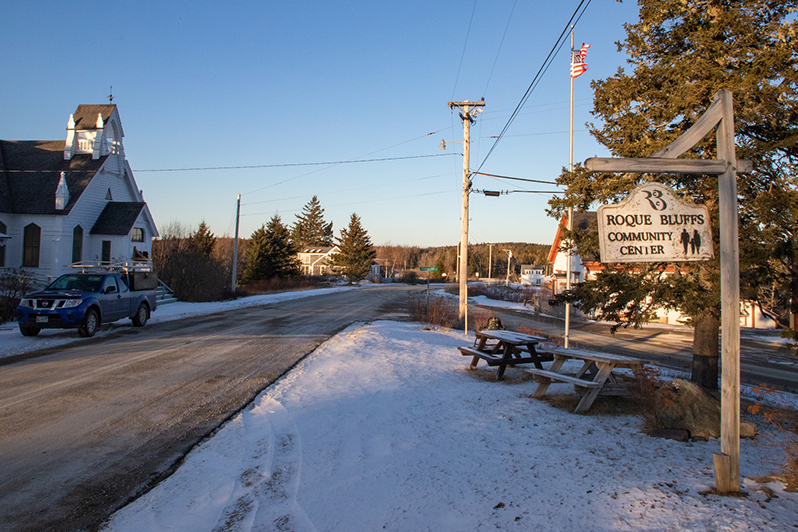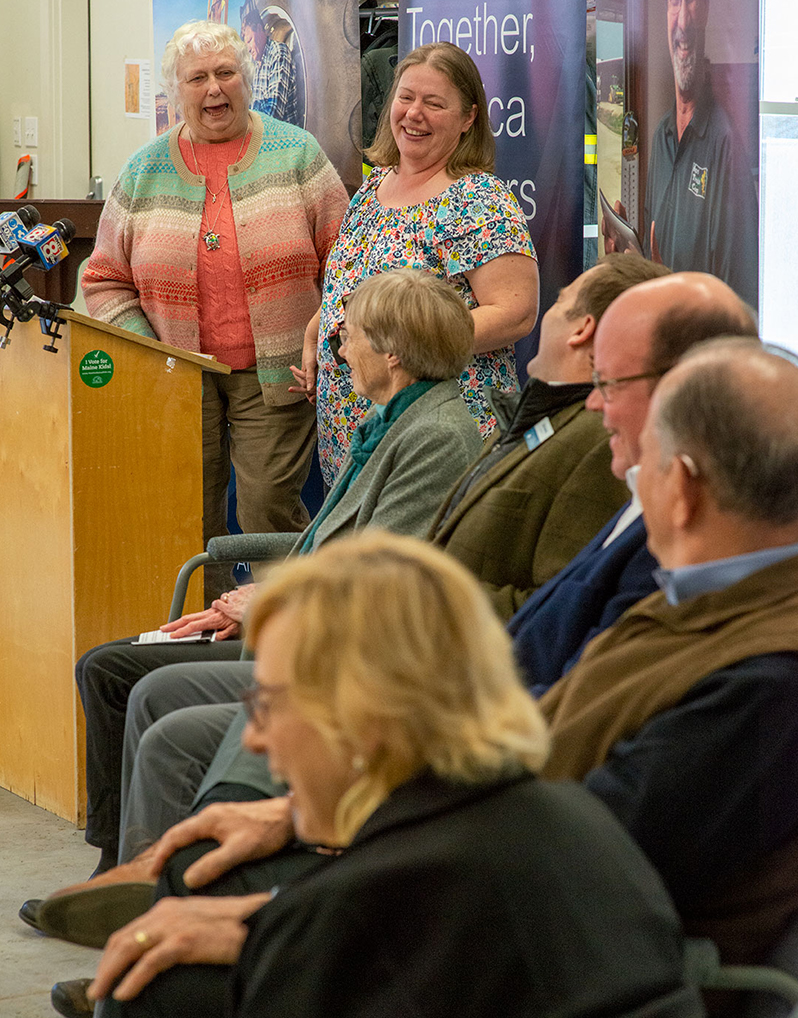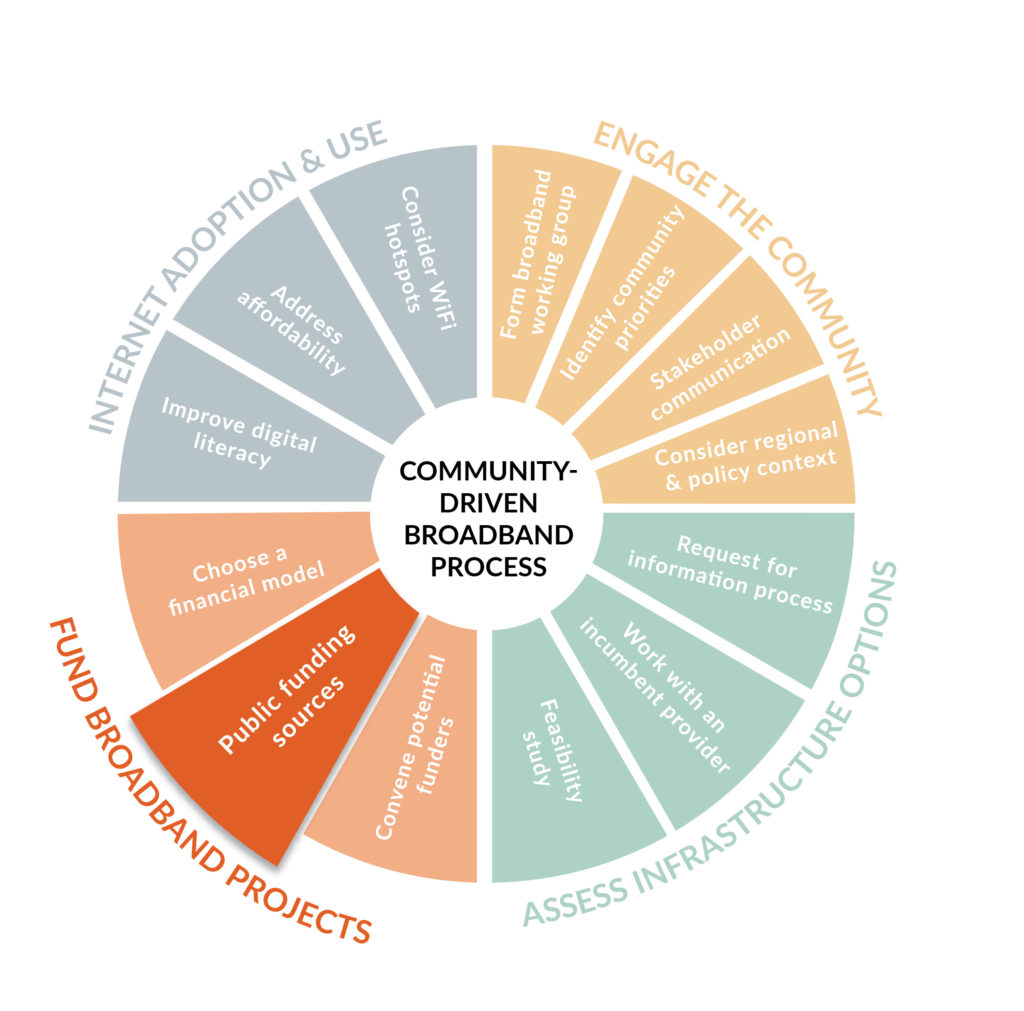BACKGROUND
Providing high-speed and reliable internet to a rural area offers a number of logistical challenges. One of the most pressing issues is finding the money to fund the projects, because most internet service providers (ISPs) do not serve rural areas due the lack of economic incentives. In densely populated areas there is a high number of potential customers which means the provider is more likely to make a profit. In rural areas where there are comparatively few potential subscribers, an ISP is unlikely to build broadband infrastructure on its own because the return on the infrastructure investment is likely to be lower or take longer. This is especially true for islands or other communities that are relatively isolated from existing networks and strengthening these connections can add significant expense to an already economically marginal project.
This means that residents of the most rural areas in the nation need to find ways to change the underlying economics of building this infrastructure, and they need to find creative ways to enable ISPs to connect them with broadband.
The USDA ReConnect Program is a source of government funds that can be allocated to broadband projects all across rural U.S. The primary purpose of the ReConnect Program is to “fund the construction or the improvement of buildings, land, and other facilities that are required to provide broadband service”. ReConnect funding comes in the form of grants, loans, or a combination of the two. They give the potential to cover the majority of expenses for infrastructure projects, but the process of applying involves more time, effort, and expertise than a small town usually has readily available. Several rural communities in Maine, however, have proven that—with enough willpower and coordination—it is possible to fill out the application. Furthermore, they’ve proven that it is possible to be awarded large sums of money which take a massive burden off of a community’s tax base. On January 30, 2020, the USDA publicly announced the coastal and island Maine municipalities that have been awarded funds as part of the first round of ReConnect funding: Roque Bluffs, Monhegan, and Arrowsic.
KEY GRANT INFORMATION (2020 – VISIT THE OFFICIAL USDA RECONNECT PAGE TO ENSURE UP-TO-DATE INFORMATION)
HOW MUCH CAN ONE APPLY FOR?
- For grants– up to $25,000,000 can be requested in a single application.
- For loans– up to $50,000,000.
- For 50% loan 50% grant– up to a combined $50,000,000.
WHO CAN APPLY?
Applicants to the USDA ReConnect program must be in a rural municipality, which the USDA classifies as having 20,000 or fewer inhabitants and does not border a municipality with greater than 50,000 inhabitants. Additionally, at least 90% of residents must have insufficient access to the internet—10mbps download / 1mbps upload or slower.
WHAT IS THE STATUS OF THE RECONNECT PROGRAM?
After a successful pilot round, the ReConnect Program opens round two on January 31, 2020 and closes March 16, 2020. A third round of funding has been approved for an early 2021 application window.
WHAT ARE THE CONDITIONS?
The network proposed to be built with the grant funds must provide at least 25 mbps/ 3mbps (This is the FCC’s definition of broadband).
There is also the requirement that 25% of the grant must be funded by a separate contribution—a source other than the USDA (e.g. funding from the town, other grants, or philanthropic contribution).
WHAT ARE THE CRITERIA?
The grant awardees are selected based on a point system. Points are awarded for: rurality, farms served, quality of service, the amount of businesses, healthcare centers, and educational facilities served, and more.

COMMUNITY EXAMPLE
One of the 2020 awardees, Roque Bluffs applied for the grant because of their historical inability to acquire adequate internet connectivity. Located at the tip of a peninsula south of Machias, and with a small population (292 residents as of 2017), Roque Bluffs has never been an attractive business endeavor for an internet service provider. As of 2020, service is offered by a handful of providers at a variety of speeds. On the northern two miles of the main road to Machias (including a portion of one side road), there has been reportedly satisfactory service provided by Spectrum, but the service does not extend to the roads branching off. Only about 40 homes have access to Spectrum’s service. Consolidated offers internet that peaks at 10 mbps / 1 mbps. Axiom’s wireless service has also been available, but they aren’t advancing their wireless options, and service through that system will never improve. Furthermore, most options are limited by data caps and inconsistency. The town colloquially refers to the pre-buildout internet as “The Intermittent Internet”.
Former First Selectman of 19 years and member of the town’s broadband working group, Lisa Hanscom is a native to Roque Bluffs, and she once assumed that her town would never achieve the internet connectivity that non-rural municipalities have access to. She was resigned to the limitations that she’d encountered. In recent years, however, it became clear that action was necessary. There had been too many instances of Roque Bluffs being set back because of the lack of broadband. Karen Miller, another member of the broadband working group and now first selectman, had similar sentiments. Her frustration snowballed as she was unable to sign up for online classes and couldn’t register the town’s chapel with the Secretary of State through their online forms. On top of this, complaints became increasingly common from parents who had to drive their children to Machias to do their online homework, and there were residents who had moved to Roque Bluffs only to quickly return to where they came from because they required better service to work remotely or achieve the quality of life they were seeking.
Action, however, proved to be challenging. Contacting the ISPs resulted in stalemates until Axiom Technologies, their incumbent wireless provider, referred the town of Roque Bluffs to the different broadband funding options that are available to rural Maine.
This was how Karen and Lisa ended up sitting down with Mark Oullette of Axiom and Stephenie MacLagan of the Island Institute to discuss what options the community could pursue.
LISTEN TO LISA AND KAREN DISCUSS THE FRUSTRATIONS ASSOCIATED WITH THEIR LACK OF BROADBAND CONNECTIVITY AND THE STEPS THEY TOOK TO INSTIGATE ACTION…
The broadband working group accelerated its efforts and mustered support with door-to-door surveys and a series of public meetings held at different times of the day to accommodate a variety of people’s schedule. By September 2018, the town allocated $20,000 to match an Island Institute broadband planning grant that would cover the working group’s efforts to survey and engage the community leading up to the ReConnect Program’s application window. In May 2019, there was a special town meeting to vote on funding the million-dollar project and bolster their commitment to the ReConnect grant application. The special town vote had the highest attendance of any Roque Bluffs town meeting on record with 110 attendees (non-residents included). If the town won the grant, the town would fund 25% of the project (as required by the USDA). If the town did not win the grant, the town would still support finding a way to fund the whole project.. Under these conditions, the warrant article passed with a 63-27 vote. This success was largely attributed to the persistence of the working group’s community engagement practices and information sharing throughout their process.

With the funding approved, the Roque Bluffs broadband working group needed to move quickly to complete the grant application. The onerous application process called for several parties to work together weekly, if not daily, to ensure a strong application was submitted. There were several roadblocks along the way—the ownership model chosen through a public-private partnership (town owned infrastructure with ISP providing operation) was hard to articulate in the application. The application is not designed for municipalities to complete, and often requires more staff time than rural communities have. The application is more user-friendly for utilities or co-ops that already have projects or design components at hand.
For example, there were questions asking for profit projections, and that wasn’t directly applicable to Roque Bluffs. The solution according to Lisa and Karen was to leverage whatever resources were available, namely, the brains one has access to. The CEO of Axiom, Mark Ouellette provided his technical expertise, the Island Institute provided grant support and networked with state representative and USDA leaders, and the town of Roque Bluffs was lucky enough to have in their midst a diligent town auditor and an astrophysicist with both grant writing experience and enthusiasm for broadband. Roque Bluffs is a key example of how a community should leverage every resource available to achieve success.
On January 30, 2020, the USDA ReConnect Program publicly announced four Maine awardees; Roque Bluffs’ broadband project was one of the winners of approximately 1 million dollars. Along with a $50,000 Connect Maine Authority infrastructure grant and a town contribution of over $200,000 through bank financing, the project is funded in full. No one knows what challenges are ahead in the buildout process, but Lisa and Karen are optimistic that broadband connectivity will allow their town to keep up as the world advances technologically.
WHAT’S NEXT?
By meeting the broadband challenge of today, Roque Bluffs is building capacity and leadership to prepare for future challenges the town may face:
- Roque Bluffs received another Island Institute Broadband Planning Grant to help with costs associated with the administration of the grant funds and project management.
- Digital literacy classes will be provided for free to enable Roque Bluffs residents to utilize broadband to its fullest potential.
- The working group dissolved, and a new broadband committee was created to oversee the project. Members include town selectmen, community members, and an Axiom Technologies representative.
- Roque Bluffs will ensure the town is equipped with current technology and accountant services to ensure all grant tracking and deliverables are met.
- Axiom Technologies and Roque Bluffs will begin the make ready process (6-9 months) for all poles within the design area to be prepared for project start in spring 2020.
RESOURCES
Originally published September 2019


